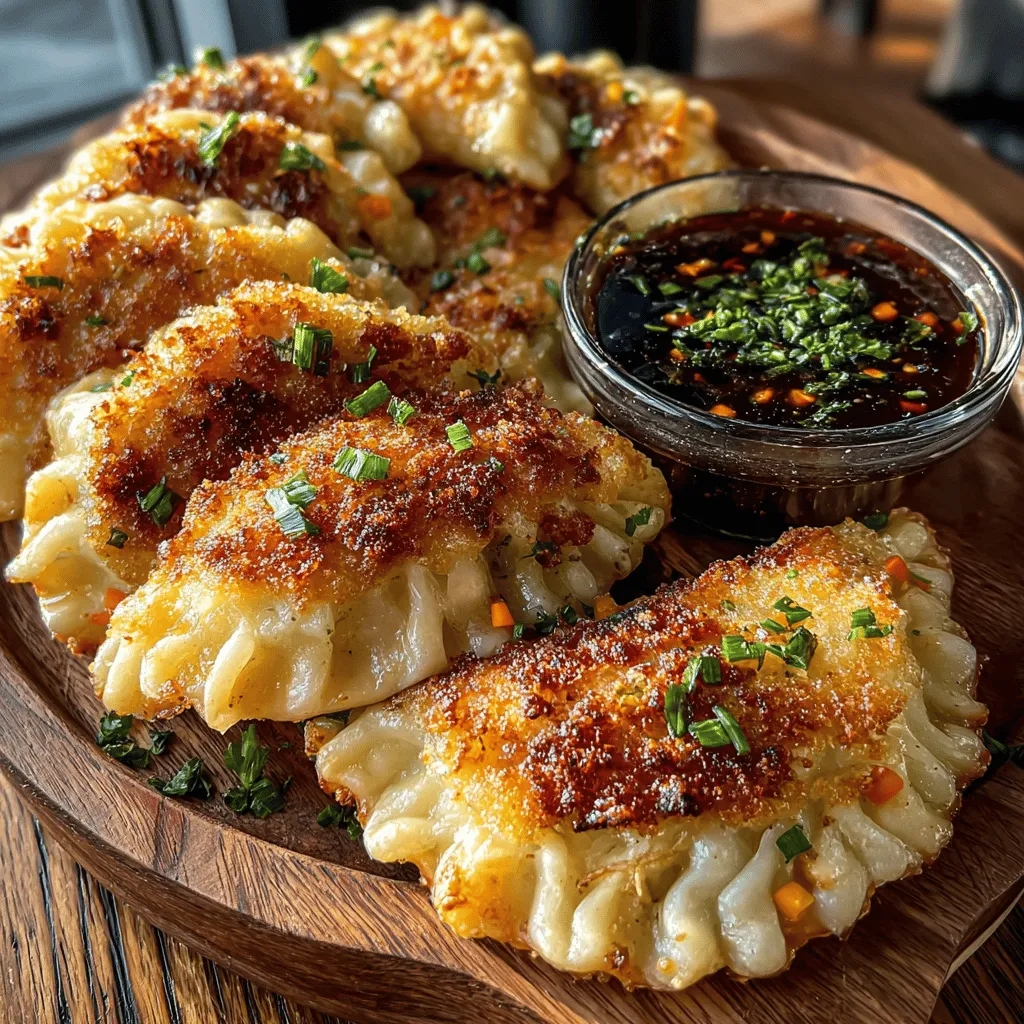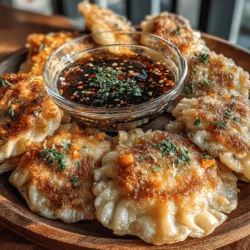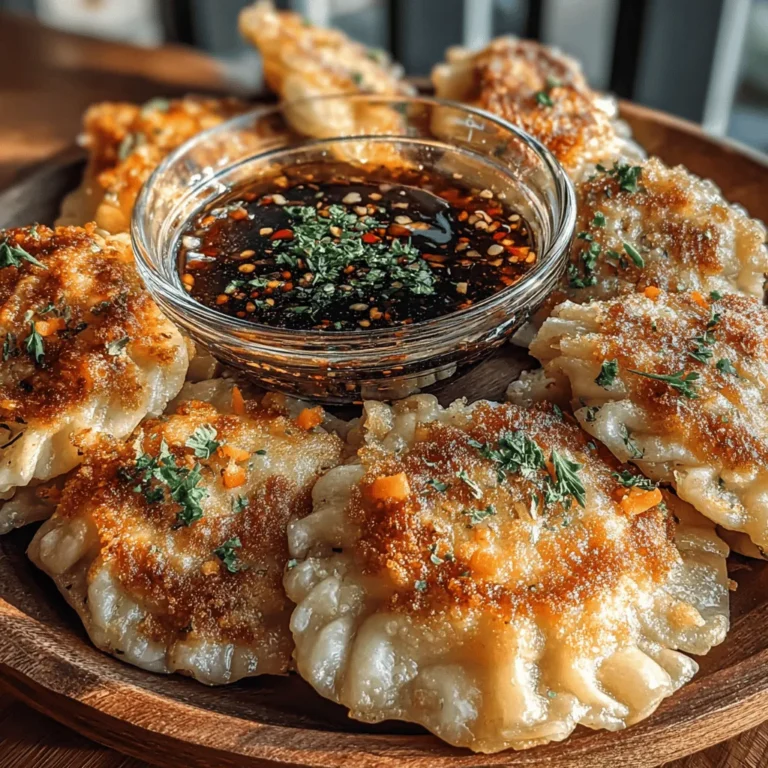Savory Chicken Potstickers: A Culinary Delight
When it comes to comfort food that packs a punch of flavor, few dishes can rival the beloved potsticker. Originating from Asian cuisine, potstickers are a type of dumpling that are pan-fried and then steamed to create a delightful combination of crispy and tender textures. Their cultural significance is profound, as they are often enjoyed during family gatherings and celebrations, embodying a sense of togetherness and culinary tradition.
In this article, we will delve into the intricacies of making Savory Chicken Potstickers, a versatile dish that can be served as an appetizer or a satisfying main course. The allure of homemade potstickers lies not only in their taste but also in the joy of crafting them from scratch. The process of making potstickers is an engaging culinary experience, allowing you to experiment with flavors and techniques, ultimately resulting in a dish that is both delicious and rewarding.
Understanding Potstickers
To truly appreciate Savory Chicken Potstickers, it’s essential to understand what potstickers are and how they fit into the broader category of dumplings. Potstickers, also known as “guotie” in Mandarin, have a unique preparation method that distinguishes them from other dumplings like jiaozi and gyoza. While all these dumpling varieties share similar ingredients, the cooking methods and textures set them apart.
Potstickers are typically pan-fried on one side until golden brown, then steamed with a splash of water, which allows the other side to become tender while retaining a crispy bottom. In contrast, traditional jiaozi are boiled, and gyoza, a Japanese variant, are usually thinner and filled with a more delicate mixture. This difference in cooking methods contributes to the global popularity of potstickers, as they offer a delightful combination of textures that appeals to many palates.
Around the world, potstickers have evolved with numerous variations in fillings and wrappers, catering to different tastes and dietary needs. From classic pork and vegetable fillings to innovative combinations featuring shrimp or tofu, the possibilities are endless. However, the fundamental essence of potstickers remains the same—the joy of sharing delicious dumplings with family and friends.
Ingredients Overview
To create truly mouthwatering Savory Chicken Potstickers, it’s crucial to select the right ingredients. Each component plays a vital role in contributing to the overall flavor and texture of the dish.
Filling Ingredients
1. Ground Chicken: The star of our potstickers, ground chicken offers a lean, flavorful base that absorbs the accompanying seasonings beautifully. It’s a nutritious option packed with protein, making it both satisfying and health-conscious.
2. Cabbage and Carrots: These vegetables are essential for adding texture and nutrition to the filling. Cabbage provides a slight crunch and moisture, while carrots offer a hint of sweetness that balances the savory flavors.
3. Green Onions, Garlic, and Ginger: Aromatics like green onions, garlic, and ginger elevate the flavor profile of our potstickers. They infuse the filling with depth and complexity, creating a mouthwatering experience with every bite.
4. Soy Sauce and Sesame Oil: These ingredients are critical for achieving that umami flavor that makes potstickers irresistible. Soy sauce adds a savory richness, while sesame oil imparts a nutty aroma that enhances the overall taste.
Potsticker Wrappers
The wrappers are another essential element of potstickers. Making them from scratch may seem daunting, but the simplicity of the dough—comprised of just flour, water, and a pinch of salt—makes it accessible for home cooks. The key lies in developing gluten, which gives the wrappers the desired elasticity and chewiness.
Cooking Essentials
– Vegetable Oil: Used for frying, vegetable oil helps achieve that perfect crispy bottom layer of the potstickers.
– Water: Acting as a steaming agent, water is crucial in creating that tender texture after the potstickers have been pan-fried.
Dipping Sauce Ingredients
No potsticker experience is complete without a dipping sauce. A simple combination of soy sauce, rice vinegar, and optional chili oil creates a balanced flavor that complements the savory filling. The acidity from the vinegar cuts through the richness of the potstickers, enhancing your overall dining experience.
Step-by-Step Preparation of Savory Chicken Potstickers
Preparing the Filling
To begin making your Savory Chicken Potstickers, the first step is to prepare the filling. In a large mixing bowl, combine the ground chicken with finely chopped cabbage and grated carrots. The vegetables should be chopped small enough to ensure they blend well with the meat, providing an even distribution of taste and texture.
Next, add in the chopped green onions, minced garlic, and grated ginger. These aromatics are crucial for infusing the filling with flavor. Don’t forget to season the mixture with soy sauce and a drizzle of sesame oil. Mix everything thoroughly until well combined. This is an important step, as proper mixing ensures that the seasoning permeates the chicken and vegetables evenly, leading to a more flavorful potsticker.
Making the Dough
Once your filling is ready, it’s time to move on to the dough. In a separate bowl, combine all-purpose flour and a pinch of salt. Gradually add warm water while mixing with chopsticks or a fork until a shaggy dough forms. Transfer the dough onto a floured surface and knead it for about 5-10 minutes. The goal here is to develop gluten, which gives the dough its elasticity.
You’ll know your dough is ready when it feels smooth and slightly tacky but doesn’t stick to your fingers. Cover the dough with a damp cloth or plastic wrap and let it rest for at least 30 minutes. This resting period is crucial, as it allows the gluten to relax, making it easier to roll out the wrappers later.
With the filling and dough prepared, you’re well on your way to crafting delicious Savory Chicken Potstickers. In the following sections, we’ll guide you through the process of assembling and cooking these delightful dumplings, ensuring that you can enjoy them fresh and warm from your kitchen.

Creating the perfect savory chicken potstickers at home can be a rewarding culinary adventure. Now that you’ve prepared the dough and are ready to roll the wrappers, fill them, and cook them to crispy perfection, let’s dive into the remaining steps that will bring your delicious potstickers to life.
The Significance of Resting the Dough for Gluten Relaxation
Resting the dough is not just a suggestion; it is crucial for achieving the right texture in your potstickers. When you first knead the dough, the gluten strands become tight and tense, which can make rolling out the wrappers difficult. Allowing the dough to rest for at least 30 minutes gives it time to relax, resulting in a smoother, more pliable dough. This is essential for rolling out even wrappers that will cook uniformly, ensuring that your potstickers have that perfect bite.
Rolling the Wrappers
Techniques for Rolling Uniform Wrappers
To achieve uniformity in your potstickers, start by dividing the rested dough into small, manageable portions, about the size of a golf ball. Lightly flour your work surface to prevent sticking. Using a rolling pin, roll each ball into a thin circle, approximately 3 to 4 inches in diameter. Aim for a thickness of about 1/16 inch. The thinner the dough, the better the wrapper will cook, allowing for that delightful contrast between the crispy exterior and the tender filling.
Tips for Preventing Sticking During the Rolling Process
To prevent the dough from sticking to your work surface and rolling pin, sprinkle a little flour on both the surface and the top of the dough. If at any point the dough starts to stick, lift it gently and add a touch more flour. Avoid using too much flour, as it can alter the flavor and texture of your wrappers. A simple tip is to rotate the dough frequently while rolling to ensure even thickness and to minimize sticking.
Filling and Sealing the Potstickers
Step-by-Step Guide on Filling and Sealing
Once your wrappers are rolled out, it’s time to fill them. Here’s how to do it effectively:
1. Measure the Filling: Take about one tablespoon of your chicken filling and place it in the center of the wrapper. This amount is typically perfect; too much filling can lead to overflow, while too little won’t provide the desired taste.
2. Moisten the Edges: Use your finger to moisten the edges of the wrapper with water. This helps create a seal.
3. Fold and Seal: Fold the wrapper in half over the filling to create a half-moon shape. Press the edges together firmly to seal. For extra security, you can use one of two sealing techniques:
– Simple Folds: Just press the edges together firmly for a clean look.
– Decorative Pleats: To add flair, create pleats along the edge of the potsticker by pinching and folding the dough. This not only looks beautiful but also helps to seal the filling inside.
Demonstrating the Right Amount of Filling to Prevent Overflow
Finding the right balance in filling is essential. An overstuffed potsticker may burst during cooking, causing a mess and losing flavor. Conversely, underfilling can lead to a disappointing bite. With practice, you’ll develop a feel for the right amount. Always err on the side of caution and start with a smaller amount; you can always adjust to your preference in future batches.
Cooking Techniques for Perfect Potstickers
Pan-Frying
Pan-frying is one of the most popular cooking methods for potstickers, delivering a delightful golden crust. To begin, choose a non-stick skillet, which is critical for preventing the potstickers from sticking. Heat the skillet over medium-high heat and add a tablespoon of oil. Once the oil is hot, carefully place the potstickers in the skillet, making sure not to overcrowd them.
1. Initial Frying: Cook the potstickers for about 2-3 minutes until the bottoms are golden brown. This initial frying process is key to achieving that crispy texture.
Steaming
After the potstickers have developed a golden crust, it’s time to steam them to ensure the filling is cooked through. Carefully add about a half cup of water to the skillet (this will create steam). Immediately cover the skillet with a lid to trap the steam inside. Let them cook for an additional 5-7 minutes.
Tips for Timing and Checking Doneness
Timing is crucial in both frying and steaming. After the steaming time, you can check for doneness by gently lifting a potsticker and inspecting its bottom. It should be golden brown, and the filling should be cooked through. You can cut one open to check if the chicken is no longer pink. If necessary, return the lid and cook for another minute or two.
Creating the Dipping Sauce
A flavorful dipping sauce can elevate your potstickers to new heights. Here’s how to create a simple yet delicious sauce:
1. Base Ingredients: Start with soy sauce, which provides a salty umami flavor.
2. Balancing Flavors: Add rice vinegar for acidity and a touch of sugar to balance it out. You can adjust these amounts according to your taste.
3. Heat Level: For those who enjoy a bit of heat, consider adding a splash of chili oil or sriracha. This can enhance the flavor profile and add a pleasant kick.
4. Presentation Ideas: Serve the dipping sauce in a small bowl, garnished with sliced green onions or sesame seeds for a visually appealing touch.
Serving Suggestions
Presentation Tips for Potstickers
When it comes to serving your potstickers, presentation is key. Arrange them neatly on a platter, ensuring they are not stacked on top of each other. This makes it easier for guests to pick them up and enjoy.
1. Garnishing: Consider garnishing with fresh herbs like cilantro or green onion for color and added flavor. A sprinkle of sesame seeds can also add a nice touch.
2. Serving Alongside the Dipping Sauce: Place the dipping sauce in the center of the platter or in individual small bowls, allowing guests to dip freely.
Pairing Ideas
To enhance the dining experience, think about what beverages and side dishes might pair well with your potstickers. Light beers, such as lagers or pilsners, complement the savory flavors beautifully. Alternatively, a refreshing iced tea or a crisp white wine can elevate the meal.
For side dishes, consider serving a light Asian-inspired salad or steamed vegetables to balance the richness of the potstickers. These options not only enhance the meal but also provide a contrast in textures and flavors.
Conclusion
Making Savory Chicken Potstickers at home is not only a delightful culinary experience but also a joyful way to connect with family and friends. The satisfaction of crafting each potsticker—from rolling the dough to enjoying that first crispy bite—is unmatched.
As you embark on this cooking journey, remember that practice makes perfect. Don’t hesitate to experiment with different fillings and dipping sauces to find your perfect combination. The communal aspect of enjoying potstickers is a beautiful way to gather around the table, share stories, and create lasting memories. So gather your loved ones, roll up your sleeves, and dive into the wonderful world of potstickers!


